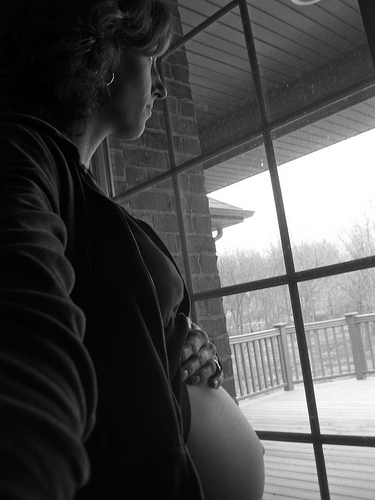 No one could have known the weight of what I was carrying that day.
No one could have known the weight of what I was carrying that day.
From the outside, I looked like any other expectant mother browsing the aisles of Target.
I was 18 weeks pregnant and wearing a bright yellow shirt and my favorite maternity jeans. My almost-two-year-old was wiggling in the front of the cart, playing with something I grabbed from the dollar section. We were passing the time while my oldest was in preschool, and I was clinging to a vanilla latte that was giving me some much-needed energy and comfort.
As we neared the toddler section, I saw someone I recognized. She was an employee stocking the accessory shelves, and I tried to make eye contact and offer a smile. She noticed me and quickly looked away.
At first, I was insulted.
But then I realized what I must have looked like from her perspective: a privileged stay-at-home mom who had nothing better to do than stroll through aisles full of things we probably didn’t need.
Little did she know that I was operating on zero sleep and had spent the entire night sobbing.
Little did she know that it took everything in me to get dressed that day and that the makeup I wore was a mask for my swollen eyes and broken heart.
Little did she know that less than 24 hours before, I sat in a cold, dark ultrasound room while a doctor told me and my husband that the child in my womb would likely face challenges ranging from brain damage and paralysis to secondary medical conditions and lifelong disabilities.
Little did she know I how scared I was, how inadequate I felt, or how much I needed something—anything—to reassure me that everything was going to be okay.
Of course, the woman in Target couldn’t have known all that. She couldn’t have known that my world was in a tailspin. She couldn’t have known how much her smile would have mattered.
The truth is, we don’t wear signs when something bad happens or when we are hurting. Most of the time, we wear armor built of fake smiles and makeup and clothes that make us feel good. Most of the time, we are just trying to make it through the day and clinging to anything that gives us hope.
That day in Target taught me a valuable lesson I will never forget. Every time I fall into the trap of comparing someone else’s seemingly perfect life to mine, I remind myself that I don’t know the whole story. Instead of jumping to shallow conclusions, I try to look at others with compassion in my eyes and empathy in my heart.
Only God knows the depths of someone’s story, which is probably why He doesn’t just ask us to choose compassion; He commands it.
Colossians 3:12 tells us:
“Therefore, as God’s chosen people, holy and dearly loved, clothe yourselves with compassion, kindness, humility, gentleness, and patience.”
Like clothing, these are qualities the Lord wants us to put on every day. Not just to make us better people, but to help others who might be struggling. No one should have to earn our compassion. We should give it
freely and generously so that we can offer hope to a hurting heart that might be barely hanging on.
We are all dealing with something hard, which is exactly why we need each other—not to compare or compete against, but to cheer on and encourage.
****
As believers, may we choose to put on compassion today, without judgement and without the need for explanation. May we look beyond the armor and the lattes and care because it is what we are called to do.
May we position our hearts outward and hold space for those we encounter, even when we don’t know the whole story.
And when we can, may we offer a listening ear, a hopeful word, and at the very least, kind eyes and a gentle smile.
You never know when that could be the very thing someone needed to make it through the day.